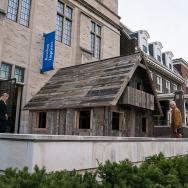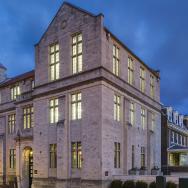The Neubauer Collegium for Culture and Society has announced 13 new research projects for 2020–21, raising the total number of humanistic research collaborations the center has supported since its 2012 launch to 100. In keeping with previous cycles, this year’s innovative projects will address complex questions that cross disciplinary boundaries and strengthen partnerships with scholars and practitioners from other institutions in the United States and abroad.
“The milestone of 100 projects gives us an opportunity to reflect on the meaning of the work we do at the Neubauer Collegium,” said Jonathan Lear, the Roman Family Director of the Collegium. “By enabling thought and creativity to move in whatever directions they need to go to address significant challenges, we are helping to develop new research methods and modes of inquiry. I am excited to continue this important work in partnership with the faculty fellows.”
The following projects will launch on July 1, 2020:
After the “End of History”: Reassessing the Communist Collapse
Faith Hillis (History), Leah Feldman (Comparative Literature)
This project will catalyze an interdisciplinary dialogue about the period of profound transformation following the collapse of Europe’s Communist regimes and work toward the creation of a new collective narrative of its meaning.
Becoming Urban: Understanding the Urban Transformation of Migrants to Phnom Penh
Marco Garrido (Sociology), Sabina Shaikh (Program on the Global Environment), Alan Kolata (Anthropology), Anni Beukes (Mansueto Institute), Julio Postigo (Indiana University)
This research project seeks to document the process of becoming urban at a critical time in Cambodian history. Through traditional and distributed ethnographic methods, the team will explore the lived experiences of migrants from rural villages to urban centers; the factors that drove the decision to migrate; and the changes that result from becoming urban.
Black Wall Street Journey
Kathleen Cagney (Sociology), Abigail Winograd (Smart Museum), Charlie Catlett (Argonne and Mansueto Institute), Robert Vargas (Sociology), Nicholas Marchio (Mansueto Institute), Rick Lowe (University of Houston)
Part of an ambitious partnership between the Smart Museum of Art, the MacArthur Foundation and the National Science Foundation–funded Array of Things project, this project will design and implement a wide-ranging data collection and acquisition effort to gain insight into the economic and social health of a South Side neighborhood.
The Formation of Fin de Siècle Vienna
John Boyer (History), Luis Bettencourt (Ecology & Evolution), Martin Kornberger (University of Edinburgh), Christof Brandtner (Stanford University), Renate Meyer (Wirtschaftsuniversität Wien), John Padgett (Political Science)
When do cities act on the challenges of their time? This project turns to Fin de Siècle Vienna for insight, fostering dialogue among scholars of bureaucracy, emergence and urban politics to examine the growth of the city from the viewpoint of the city itself.
The Geological Foundation for Human Evolution
Zeresenay Alemseged (Organismal Biology & Anatomy), Mulugeta Araya (Addis Ababa University)
This research project will support the collaborative study of geological and paleontological data gathered from transdisciplinary fieldwork in Ethiopia. Deeper understanding of the geology and geotectonic history of the region will inform the team’s interpretation of the ways the changing landscape shaped the evolution of our ancestors.
The Infrastructures of American Hegemony
Ruth Bloch Rubin (Political Science), James Sparrow (History), Kathleen Belew (History), Julian Go (Boston University), Daniel Immerwahr (Northwestern University), Daniel Abebe (Law School), Jennifer Pitts (Political Science), Austin Carson (Political Science)
This project will explore the changes that enabled the United States to enter into global politics—first as an imperial force and later as a decisive player in two world wars. The team will focus on the advocacy infrastructure undergirding America’s hidden empire and the material infrastructure of America’s global turn, with the aim of inspiring new collaborations between scholars of international relations and American politics.
Landscape Blindness: An Archaeological Ailment
Sarah Newman (Anthropology), Felipe Rojas (Brown University), Eduardo Góes Neves (University of São Paulo)
This project seeks to diagnose and treat “landscape blindness”—archaeology’s inability to visualize and understand certain massive, multi-scalar and multi-temporal human manipulations of the environment. A team of archaeologists, scholars, scientists, architects and artists will combine field research with collaborative dialogue to consider the theoretical implications of these hitherto unseen landscapes.
Logistics in the Making of Mobile Worlds
Julie Chu (Anthropology), Jennifer Cole (Comparative Human Development), Jack Mullee (Anthropology), Heangjin Park (Anthropology)
This project seeks to use logistics as a lens through which to innovate new theories and methodological approaches for understanding the entangled nature of contemporary mobile worlds.
Making Progress on Death: Towards an Updated Normative Framework
Christos Lazaridis (Neurology), Lainie Ross (Pediatrics), Fernando Goldenberg (Neurology)
Fifty years after the term “brain dead” was introduced, there is persistent dissent among clinicians, philosophers and other critical observers about the meaning of the term and its relation to the death of a human being. These challenges necessitate a reexamination of the neurological standard enshrined in law and medical practice. This research project will undertake such a reexamination.
Practices of Emancipation II
John Clegg (Sociology), Chris Taylor (English), Alisea Williams McLeod (Rust College)
In the first phase of this project, the research team geocoded the enlistment and birth locations of over 100,000 African American Civil War soldiers and produced a dynamic map of emancipation. In the second phase, the team will link these soldiers to a database of freed people in Civil War refugee camps. A capstone conference will explore the broader implications of the research and identify opportunities for further collaborative work.
Pulmonographies
Kaushik Sunder Rajan (Anthropology), Stacy Hardy (Rhodes University), Neo Muyanga (Independent Composer and Musician)
This collaborative project will explore biographies and geographies of breath through a focus on the colonial histories and postcolonial politics surrounding tuberculosis in South Africa. The team will plan and perform several performance lectures in South Africa and Chicago, and will disseminate key research objects and findings.
Slavery and Visual Culture
Agnes Lugo-Ortiz (Romance Languages & Literatures), Larissa Brewer-García (Romance Languages & Literatures), Allyson Nadia Field (Cinema & Media Studies), Danielle Roper (Romance Languages & Literatures), Chris Taylor (English)
This interdisciplinary project builds on research conducted by the UChicago Working Group on Slavery and Visual Culture to help formalize the group’s contributions to scholarship about the histories of slavery and visuality.
Transmission of Magical Knowledge in Antiquity: The Papyrus Magical Handbooks in Context, Part II
Sofía Torallas Tovar (Classics), Christopher Faraone (Classics)
In the first phase of this project, the research team carried out the basic editorial work for the first volume of an edited text and translation of an important corpus of ancient magical handbooks, a resource long awaited by papyrologists and historians of religion and of the ancient world. In this phase, the team will finalize the edition of the second volume.
—Story was first published on the Neubauer Collegium website.









